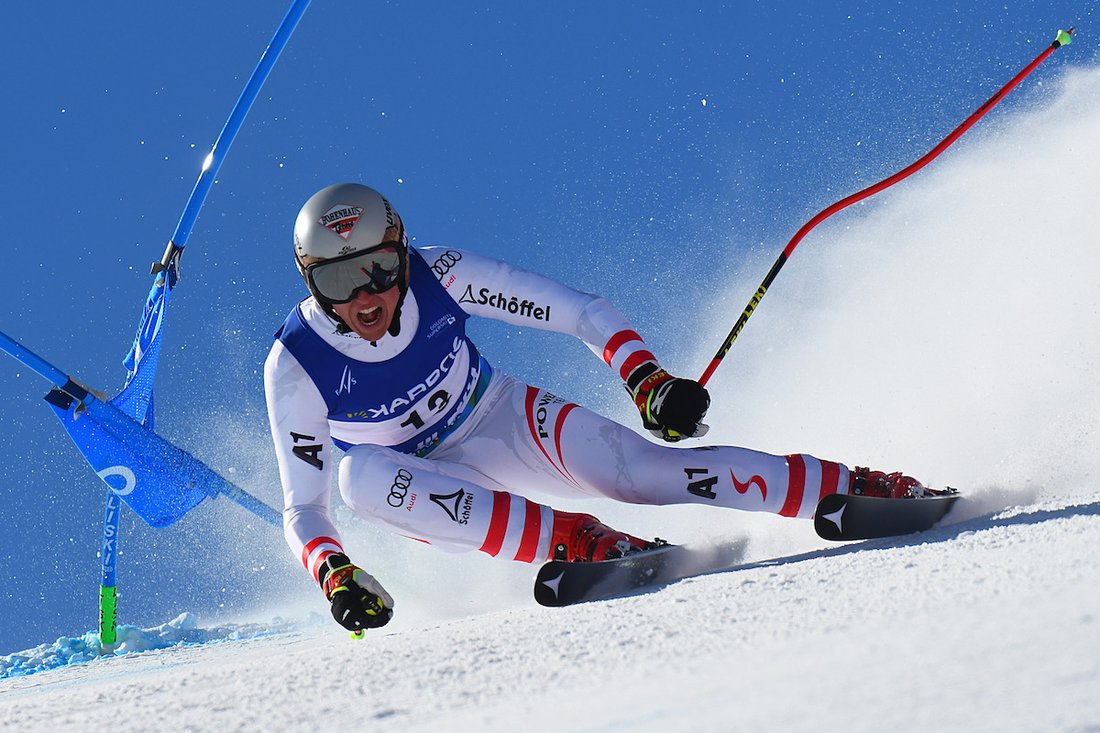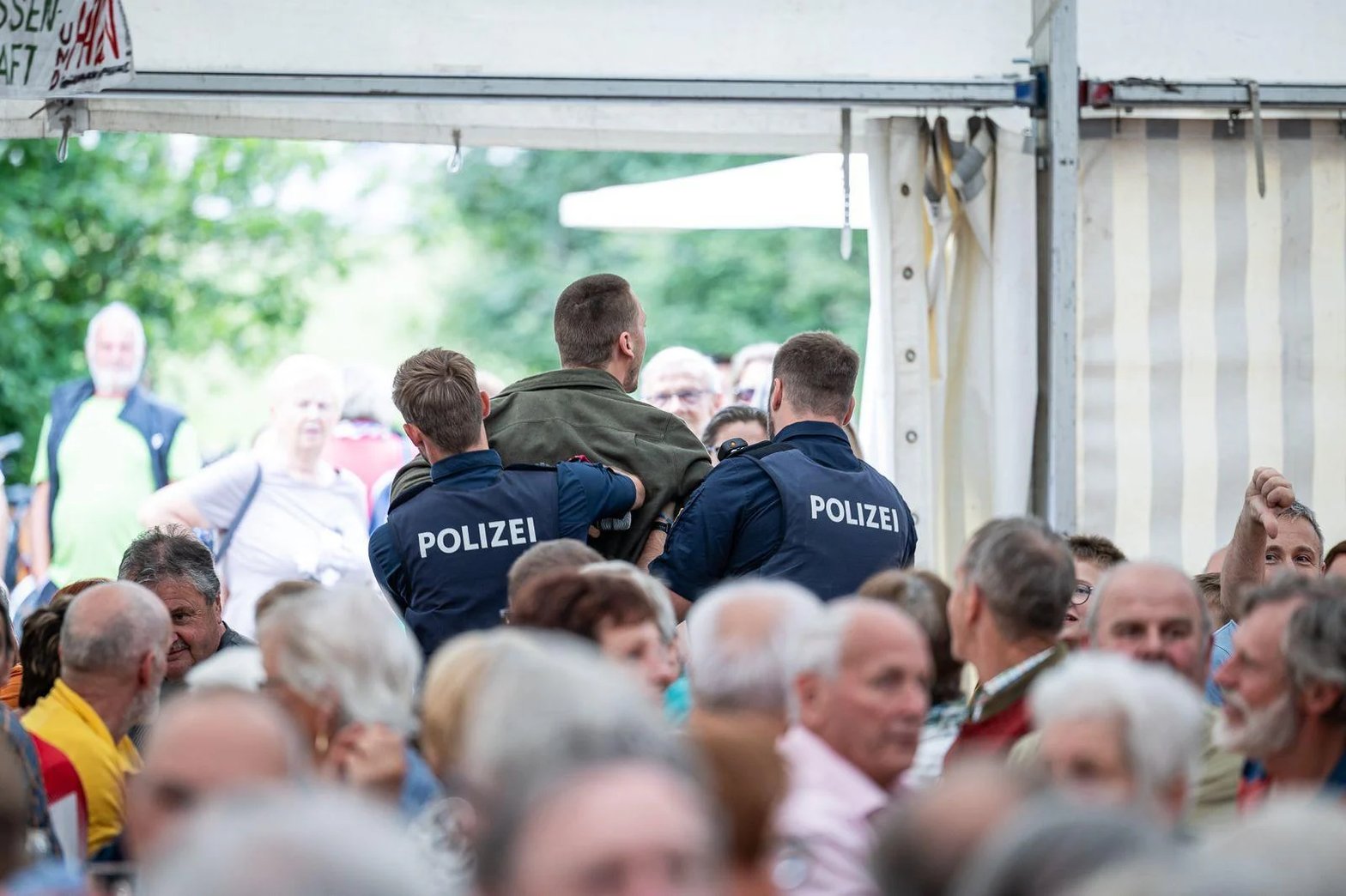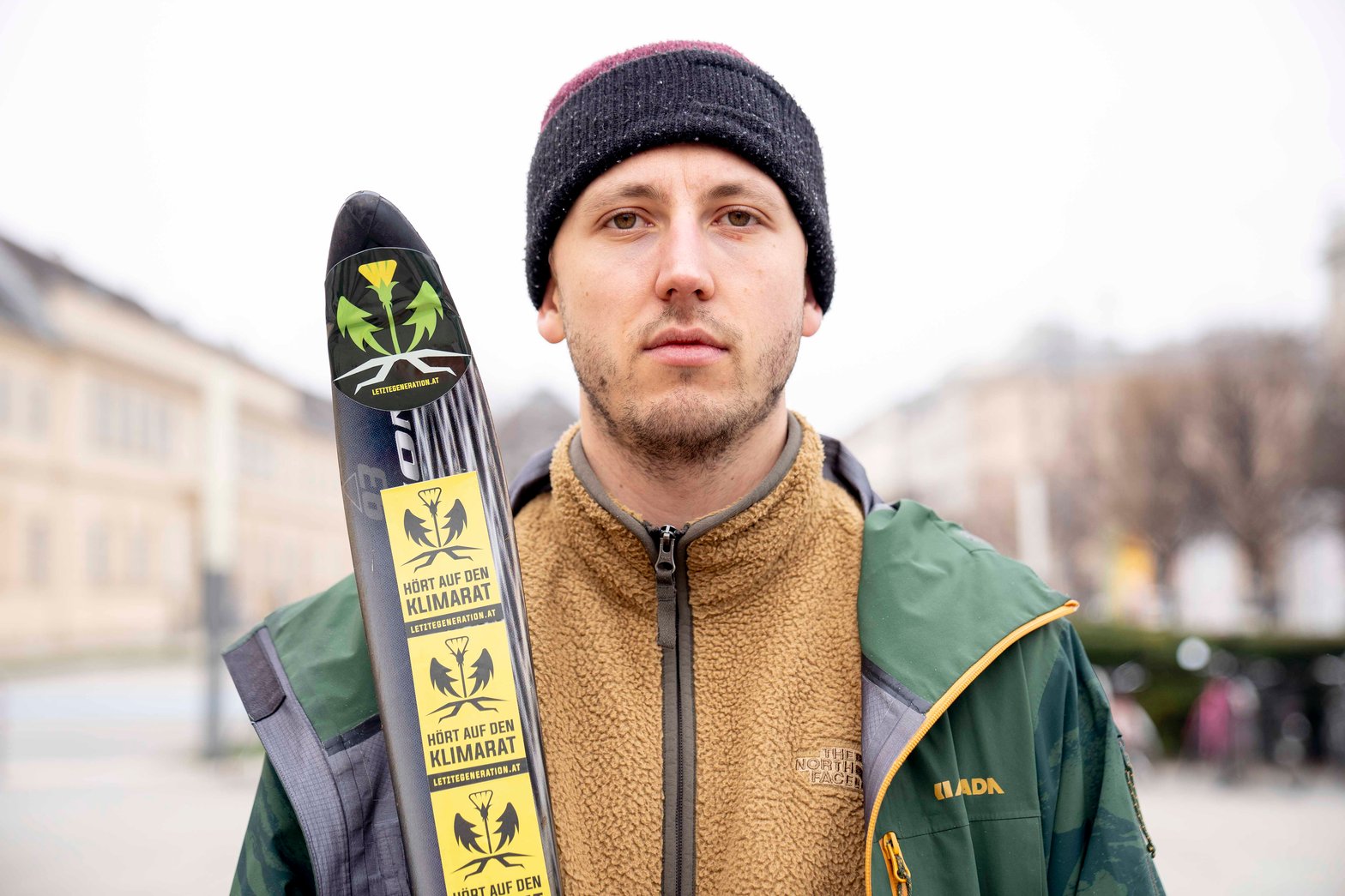Julian Schütter, the Skier in Collapse
Rencontre avec Julian Schütter, activiste autrichien chez Letzte Generation et ex-skieur professionnel. Interview en anglais


Julian Schütter is a former professional alpine skier and a climate activist from Austria. With Letzte Generation, he has participated in a number of protests that involve interrupting events, usually when a politician or official is giving a speech, by climbing on stage and talking about the need to act against climate change.
We wanted to ask him a few questions about the activism he is doing across the Alps and his current relationship with the sports industry.
When and why did you start activism?
I started engaging in activism in 2020. Before that, I had attended a few climate strikes and demonstrations, but it was during that summer that I started to do organizational work for “Fridays for Future” and joined the civil resistance movements. A speech from the German climate activist Carola Rackete triggered my decision. I was already aware of climate change, but hearing her speak on TV made me realize how massive and urgent the issue is. It really affected me emotionally and the winter that followed was particularly tough; I questioned whether I could sustain my lifestyle as an athlete, knowing what the future holds and considering my own environmental carbon footprint. I even thought about quitting sports. But after talking it over with my psychologist, I decided to come up with a strategy to use my platform as an athlete to advocate for change. That’s why I chose to stay in the sport a little longer and become an activist. Back then, I was still hoping for a miracle and thought that civil resistance could somehow prevent the climate collapse.
« Skifahrer in Kollaps » is your description on social media. What does it mean exactly?
Even though I am no longer a professional athlete, skiing is still a huge part of my life, and I continue to see myself as a skier. But the truth is: this title is rather new. Before the summer I still used to describe myself as a “skier in resistance” to echo with my recent years of involvement with “Letzte Generation”, where I was actively engaged in peaceful civil resistance. However, things have shifted recently. “Letzte Generation” decided to stop protesting in July, after many of us came to the difficult realization that our original goal — to prevent the climate catastrophe — is no longer achievable. We’ve reached the point where we now believe the collapse of our civilization is inevitable. The process which dissolves our civil institutions and erodes our living standards has already begun. Staple foods like coffee, cocoa, and olive oil become more expensive because they’re harder to harvest due to climate change ; natural disasters become more frequent and severe ; far-right political movements rise… What’s happening now is exactly what scientists have predicted for years — and it’s not going to get better.
This realisation also changed something in me, and that is why I went from being a skier in resistance to a skier in collapse. And probably why I decided to stop being a professional skier.
« There is little point in continuing to fight against the catastrophe. We better start fighting within it »
Does this mean you and the movement are giving up?
We are not giving up, but we are shifting to a new phase of activism. In a way, it is about accepting reality. We acknowledge that the people and corporations we have been fighting against are stronger and have far more resources than we do. We also recognise that our actions have not been enough to change the course of history. But this is not about resignation — it is about reallocating our efforts. For example, I do not believe that we should continue to focus on reducing greenhouse gas emissions. At this point, there is little point in continuing to fight against the catastrophe. We better start fighting within it. We need to see the catastrophe itself as the new context - as our new playing field. And that means changing our strategies.
Over the summer, you distanced yourself from the sport industry. Why?
I did not make much of an effort to keep in touch with the sporting community because I wanted to step away from it for a while. The people involved in environmental activism are very different from the world of professional athletes, and I really enjoyed being around them and embracing this new environment. It was a learning experience, and I gained a lot from it. But that doesn't mean I want to stay away for too long. I am already planning to do a lot of skiing this winter - not racing like I used to, but freeriding or ski touring.
« People involved in environmental activism are very different from the world of professional athletes »
In France, people involved in environmental activism are often labeled as eco-terrorists. Is it the same situation in Austria?
Yeah, this is not just a French phenomenon. In Austria, it is not so extreme yet, because we have had a relatively moderate government for the last four years (before the last election). A centre-right party was the dominant force and the Greens were a smaller coalition partner. They were very strategic in avoiding heavy-handed repression in order to avoid a backfire effect - which was not ideal for us. One of the aims of civil resistance is to provoke strong, sometimes violent reactions from the authorities, in the hope of a backlash that can rally public support. Historically, this has worked during the US civil rights movement or during the suffragette movement in the UK. Harsh treatment by the authorities mobilised people to join these causes because they saw how unfairly the activists were treated. In Austria, the government has not followed that path. Instead, it has opted for a more subtle form of repression. We have had to deal with a lot of small fines and a lot of court appearances for minor offences over the last few years. It has been effective in its own way, because it's taken up a lot of our time and resources.
However, even if the government had used more overt repression, I am not sure the backlash would have happened because it often seems that we are so dehumanised that the public reaction is not what it should be. For instance, I really wonder how come that in the UK judges have sentenced activists to two years in prison just for throwing soup at a painting window? Is that what we call justice? Same in Germany, according to Amnesty International, the police have “tortured” climate activists and still nobody cares. Why aren't more people on the streets protesting against those clear overreach?
Have you ever been called an ecoterrorist?
When I was still a professional athlete, I did a campaign with Protect our winters (POW), where I wrote an open letter to the FIS, the International Ski Federation, and a lot of active athletes signed it. Even though it was a very moderate campaign, just an open letter with signatures, so really nothing outrageous, there were still some people who called me an eco-terrorist for doing that. So I guess it doesn't really matter what you do. If you're gluing yourself to the street or if you just sign a letter.
« I went from being a skier in resistance to a skier in collapse »
Knowing both sides - the athlete and the activist - how do you think athletes should respond when competitions are interrupted by activists?
When it comes to athletes facing protests that disrupt their competitions, I believe the best thing they can do is show solidarity. To say something like, "Yes, it's uncomfortable that our race has been interrupted, but these activists are actually right.” That alone would be enough, and would already be a powerful statement. But unfortunately that's not what usually happens.
In November 2023, a ski race was disrupted by activists who ran into the finish area just as the last three athletes were about to start their run. It was a crucial moment to the race, and they sprayed orange paint on the snow. The disruption lasted for about ten minutes. But some athletes who had already finished went straight to them and dragged them out of the finish area with the help of security. One athlete, Henrik Kristoffersen, even physically hit one of the activists. It was really upsetting, because while I can try to understand the adrenaline rush after a race and/or empathise with the other athletes who did not have the same light conditions, I believe that violence is never an answer, especially in professional sport where people are role models for children. And the story did not end there. A few minutes later, this same athlete said in an interview that he would hit the protester again if given the chance, and that those people "shouldn't exist". And most of the skiing community celebrated him on social media…
I was the only one who publicly spoke out against it, suggesting that the focus should be on solidarity and addressing climate change, so these protests could end. But I got a lot of hate for it and almost no support from the skiing community, apart from my sponsor Atomic. That day, I felt very isolated. I never imagined professional sport would glorify violence in such a way.
Could this happen again?
Absolutely. Nowadays, when protesters disrupt a competition, the rule on TV is to stop filming and go to commercials... And that has two consequences: it prevents viewers from realising what's happening, and it creates a situation where activists are more vulnerable to physical retaliation because there's no footage to hold people accountable.
Do you have any wishes for the ski industry?
I don't think it will change unless it is forced to, but I would love to see the ski industry return to a more modest and frugal approach. The current model of industrial consumerism - where people collect skis and travel the world - is incredibly damaging to the environment. The process of making skiing a luxury sport for the wealthy is also deeply questionable. I wish it would become more accessible to the middle class again.
Finally, I wonder why we are not pushing the beginning of the competition calendar later when the snow is actually there, instead of artificially pushing the season to start in October.
Why is sport political for you?
Given that everything that organises how we live in a community is political, sport is definitely political. It is a huge part of our society.
In general, when someone thinks that sport is not political, it is usually a sign of privilege. It means they don't feel the effects of political systems because they're not the ones who suffer from them. They are not the people who can afford not to be political.













